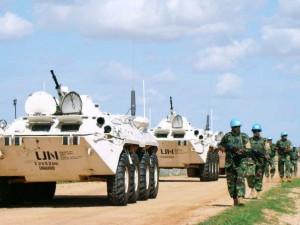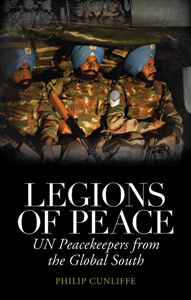With the ongoing crisis in Iraq, one news story from the Middle East that you might have missed recently was the release on 11 September of 45 United Nations (UN) peacekeepers that had been captured on 28 August by the Al-Nusra Front, a Syrian anti-government militia linked to Al-Qaeda. The peacekeepers were Fijian soldiers stationed in the Golan Heights. Having threatened them with a Sharia trial, the UN despatched special negotiation teams to the region. It is no surprise that the world’s media has paid less attention to the fate of Fijian soldiers than they would if the same thing had happened to Western soldiers. But this effect is not only the result of a biased media. It is the outcome of a political strategy through which the burdens of UN peacekeeping have been systematically deflected away from Western forces since the mid-1990s. The UN peacekeeping system has allowed Western states to harness the armies of developing countries into a force multiplier for their projects of global intervention.

The presence of soldiers from the Pacific on the other side of the world in a conflict in which their country is not involved is far from untypical. The Fijians in the Golan Heights are only a small part of a large and cosmopolitan army nearly 100,000-strong deployed around the world across 16 missions. With the overwhelming media focus on Western military intervention in Afghanistan and the Middle East, it is still not widely known that, after the US, it is the UN that deploys the most military forces around the world. There are more UN peacekeepers fighting in the eastern border regions of the Democratic Republic of Congo, for example, than there are Russian soldiers in eastern Ukraine. The mission on which the captured Fijians served in the Golan Heights was a thirty-year-old artefact of the Arab-Israeli conflict. Many other peacekeepers are despatched to ongoing conflicts that are of a more recent provenance, often with deadly consequences. Casualties among peacekeepers have been steadily mounting in Mali, for example, where a UN mission has been deployed with a mandate to use force and to help extend the authority of the central state throughout the troubled north of the country. In total 3250 UN peacekeepers have died since 1948.
That this global army is largely invisible in public debate reflects the fact that the overwhelming majority of UN peacekeepers come from developing and transitional countries, mostly in South Asia and Africa. But while these countries provide the soldiers, they do not call the shots. UN peacekeeping is predominantly financed by Western states and politically controlled by the UN Security Council, which is in turn dominated by the ‘P3’ – the three veto-wielding Western states: Britain, France and the US. The same is true of various regional peacekeeping operations, which are often prostheses grafted onto a UN base. This is true of the hybrid African Union-UN mission in Darfur and the African Union mission in Somalia, effectively an extension of the US ‘war on terror’ in the Horn of Africa.
In an era in which global Western power is in decline and in which armies are shrinking and military budgets are strained, multilateral peacekeeping arrangements manned by developing countries allow Western states to project global power at minimal political risk and vastly reduced cost, even if this comes at the expense of strategic coherence. Richard Gowan of New York University’s Center on International Cooperation estimates that one NATO soldier is five times more expensive to deploy to the field than a UN peacekeeper. But the benefits are not only financial: UN peacekeeping expands the possibilities for military intervention. The political costs to France of intervening in its former colonies such as Cote d’Ivoire and Mali would have been much higher without the possibility of deploying alongside UN forces. Such arrangements allow Western states to mount military campaigns—such as Britain’s Operation Barras in Sierra Leone in 2000 or France’s 2012-14 Operation Serval in Mali—without needing to confront the costs and risks of long-term nation-building and occupation that would normally result from military intervention. These burdens can be carried by the blue helmets and UN agencies: the UNAMSIL mission in Sierra Leone and the MINUSMA operation in Mali. Although essential props to Western power, these UN missions (whose soldiers were mostly provided by Pakistan and Bangladesh) never endured the kind of public debate and legislative scrutiny to which Western operations in Afghanistan and Iraq have been subjected.
In short, Western military intervention is not just about cruise missiles, drone strikes and NATO rapid reaction forces. It is also about Ethiopian, Uruguayan, Jordanian and Pakistani peacekeepers financed, controlled and supported by Western states to deploy to obscure missions in forgotten wars around the world. Next time a humanitarian crisis or conflict prompts cries of ‘something must be done’ in the West, let us not forget that that ‘something’ will likely depend on the soldiers of the Global South acting on our behalf.
 Philip Cunliffe is Senior Lecturer in International Conflict at the University of Kent. His most recent book is Legions of Peace: UN Peacekeepers from the Global South.
Philip Cunliffe is Senior Lecturer in International Conflict at the University of Kent. His most recent book is Legions of Peace: UN Peacekeepers from the Global South.